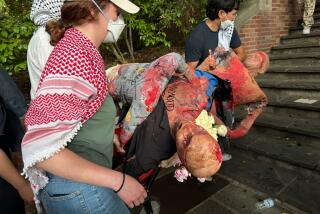China Police Seal Off Beijing Square as Students March
- Share via
BEIJING — Chinese students and authorities appeared to be headed for another confrontation today as police sealed off Tian An Men Square and defiant pro-democracy protesters began to march.
Shortly after 8:30 this morning, 5,000 or more Beijing University students left their campus in the northwestern section of the Chinese capital and began marching toward downtown. Police made no immediate attempt to stop them.
Students carried banners with pro-democracy slogans and chanted, “Down with corruption!” and “Patriotism is not a crime!” They also shouted criticisms of China’s official news media, which have carried only severely censored reports about their protests.
The students appeared to be headed toward Tian An Men Square in central Beijing, but some students said they would first go past the headquarters of the official New China News Agency, which is along one of the routes to the square.
Students also assembled this morning at other Beijing campuses and were expected to attempt to link up in a single march. About 200 police officers gathered this morning on a sidewalk near Beijing Teachers University, which has been a key center of the protests.
At least 1,000 police officers were already blocking pedestrian traffic from Tian An Men Square as the student marches began. Protesters have staged several huge demonstrations at or near the square since a wave of pro-democracy protests began nearly three weeks ago.
Unofficial reports indicated that student demonstrations were also being planned for today in other Chinese cities.
International Meeting Nearby
About 2,000 finance officials, bankers and other dignitaries from about 40 countries are attending a meeting of the Asian Development Bank today in the Great Hall of the People, which faces the square. Beijing authorities announced Wednesday that the square would be closed to pedestrians during the meeting, which Chinese President Yang Shangkun was scheduled to address.
Communist Party General Secretary Zhao Ziyang, speaking Wednesday at a meeting celebrating the 70th anniversary of a 1919 student protest that launched the pro-democracy and pro-science May 4th Movement, added his voice to those trying to calm the protests.
“Zhao Ziyang said today that the desire of Chinese students and others for promoting democracy, combating corruption and developing education and science coincides with the aims of the Chinese Communist Party,” the official New China News Agency reported Wednesday.
Zhao warned, however, that “China’s magnificent and arduous modernization drive and reform can be smoothly carried out only in a stable social and political environment,” the agency reported.
“When we have stability we sometimes aren’t aware of its value,” Zhao is quoted as saying. “But once we lose it we feel deep regret.... Stability, gradualism, sober-mindedness, order and legality are not only required by economic construction and reform, but also by democracy and science.”
Many students, however, believe that in the wake of a refusal by the government to open a formal dialogue with the ad hoc student association that has organized more than two weeks of demonstrations, another show of strength is vital.
Among the key demands of students are greater press freedom, improved treatment of intellectuals and a stepped-up attack on corruption. They also want legalization of independent student associations free of government control.
About 80 Chinese journalists from state-run official media met Wednesday at a Beijing museum to organize their own protests against government controls.
Journalists said they had drafted petitions protesting the recent decision of Communist Party leaders in Shanghai to fire Qin Benli, the reformist editor of the Shanghai-based World Economic Herald, from his post. The petitions, which journalists said would be presented to the Communist Party Propaganda Department and the State Press and Publications Administration, also call for freedom of speech and press.
With a few exceptions where editors have broken rules, the Chinese media have generally been restricted to printing incomplete accounts of the dramatic protests prepared by the official New China News Agency.
During a massive pro-democracy march last Thursday by about 50,000 students and a roughly equal number of non-student supporters, protesters chanted rhymes ridiculing the official Chinese media.
“Chinese journalists feel ashamed,” said a reporter at Wednesday’s meeting. “Fifty thousand students took to the streets last week, and millions of ordinary people watched and sympathized. But we have simply not reported this kind of obvious fact.”
Some reporters said they intended to stage their own protest today Thursday outside the headquarters of the New China News Agency. Journalists risk dismissal and termination of their careers for such open defiance of Communist Party control.
State Council spokesman Yuan Mu, speaking to Chinese and foreign reporters at a Wednesday morning press conference, charged that “behind the students are a very few people ... trying to create social disturbances.”
More to Read
Sign up for Essential California
The most important California stories and recommendations in your inbox every morning.
You may occasionally receive promotional content from the Los Angeles Times.













